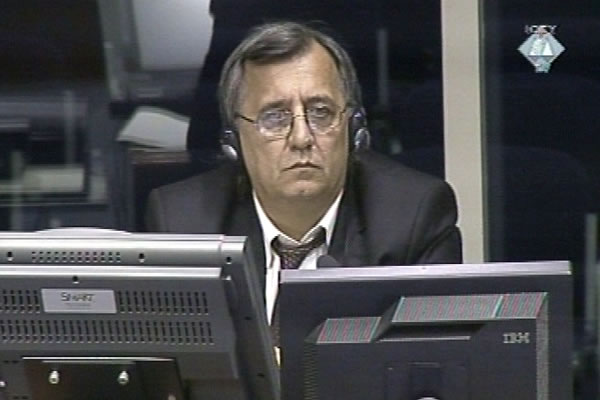Home
WHAT ‘LIES’ WERE SPREAD ABOUT WITNESS
The former minister for culture and religion in Hadzic’s government contends that it ‘is not true’ that he either committed or ordered any murders or that he supported ‘discriminatory policies against the non-Serb population’. The witness also claims it is untrue that he was an ‘outstanding fighter’ and that he knew who was authorized to appoint people in the Territorial Defense. The truth was, the witness argues, that the government couldn’t exercise command over the units in the field. In the case of the killings at Ovcara, the army ‘made this decision’, the witness says
 Borivoj Milinkovic, defence witness at Goran Hadzic trial
Borivoj Milinkovic, defence witness at Goran Hadzic trial A protected witness completed his evidence at the trial of Goran Hadzic; his testimony was heard entirely in closed session. Borivoje Milinkovic, former minister for culture and religion in the government of the SAO Slavonia, Baranja and Western Srem, returned to the witness stand for the cross-examination. Last week in the examination-in-chief the witness claimed that Hadzic’s government had no powers whatsoever over the army and the Territorial Defense. According to the witness, the government dealt with social issues and could not influence the events in the field.
Prosecutor Matthew Gillet showed a statement made by a witness at the District Court in Osijek. The witness accused Boro Milinkovic called Vrlja of the murder of Petar Djevelkaj in Dalj. Milinkovic said he was aware of the allegations but they were not true. The prosecutor then showed a report from the Vojvodina State Security Service indicating that Milinkovic had ordered the killing of his ‘source’. Milinkovic explained that it too ‘isn’t true’. He also denied that he had ever tried to play down the responsibility of Hadzic’s government for the crimes committed in Eastern Slavonia. The witness argued that he was ‘against killing’ and that, in his view, the ‘culprits should be prosecuted’.
As he answered questions asked by the prosecutor Milinkovic agreed that the defense minister ‘might’ have had powers over the Territorial Defense. However, he ‘wasn’t informed about that’, Milinkovic noted.
In the examination-in-chief Milinkovic insisted that on 20 November 1991 the government held a meeting in Velepromet in Vukovar, not an officialsession. According to Milinkovic, the transfer of the prisoners to the Ovcara farm hadn’t been discussed at the meeting. The prosecutor showed the witness the recording of Hadzic’s interview in which Hadzic spoke about the government meeting and the conclusion that the prisoners should be prosecuted in the SAO Slavonia, Baranja and Western Srem. Milinkovic assumed that it was a ‘political statement’. The witness stuck to his previous claim, adding that the government ‘couldn’t have been in command’ and that the ‘army made such decisions’. Milinkovic also insisted that he didn't know if anyone was ever prosecuted for the Ovcara crimes by the SAO SBZS authorities.
The prosecutor suggested that Hadzic and the witness both had a vested interest in ‘denying the existence of a discriminatory policy against the non-Serb population’. Milinkovic stressed that it ‘isn’t true’ adding that ‘half’ of his family on the mother’s side were Croats.
At the end of the cross-examination the prosecutor showed Goran Hadzic’s interview from July 1993. In the interview Milinkovic was described as a fighter, rather than as a ‘pacifist’ as Milinkovic described himself in the examination-in-chief. The witness explained that according to the journalists ‘everyone was a fighter and commander’, but the description was ‘not correct’.
Linked Reports
- Case : Hadzic
- 2014-09-11 CULTURE MINISTER TESTIFIES IN PRIME MINISTER’S DEFENSE
- 2014-09-10 DID SESELJ ‘REVISE’ OR ‘SUPPLEMENT’ HIS TESTIMONY?
- 2014-09-09 OVCARA ACCORDING TO SESELJ
- 2014-09-17 GUARD, DOORMAN, BODYGUARD
- 2014-09-22 ‘PLAYFUL SOUL’ OR ‘SERIOUS GENTLEMAN’
- 2014-09-23 HADZIC EXERTED 'LIMITED INFLUENCE’ IN KRAJINA
